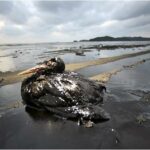As Governor Charlie Crist heads to the Panhandle to get a first hand look at how Florida is preparing for the impact of what could be the largest environmental disaster in the US in decades, oil continues to pour out from three leaks of a BP well, 130 miles southeast of Louisiana. If it has not already, officials expect that the oil slick which began last Thursday, will later on Saturday reach the marshes off the coast of Louisiana and likely spread to Mississippi, Alabama and Florida, impacting fisheries, the bird population and populated areas.
 The most up-to-date estimates are that 1.6 million gallons have now spilled into the Gulf and the slick is 130 miles long and 70 miles wide, as reported by CNN.
The most up-to-date estimates are that 1.6 million gallons have now spilled into the Gulf and the slick is 130 miles long and 70 miles wide, as reported by CNN.
President Obama said yesterday that he had dispatched the Secretaries of Interior and Homeland Security, as well as the Administrator of the Environmental Protection, Assistant for Energy and Climate Change Policy and the NOAA Administrator to the Gulf Coast to support response efforts.
The White House today confirmed that Obama will visit the Gulf Coast on Sunday in view of the national significance of the oil spill.
Obama said there are now five staging areas to protect sensitive shorelines; approximately 1,900 federal response personnel in the area; and more than 300 response vessels and aircraft on the scene. He added that approximately 217,000 feet of protective boom have been laid, with more on the way. The government also approved Louisiana’s request for 6,000 national guard troops to support clean up efforts.
Officials and environmentalists alike are fearful of the catastrophic consequences to the coastal wetland areas, marine life and associated economic consequences as a result of such a large-scale oil slick. The Gulf area is the largest sea food producer in the world and Louisiana is home to 40 percent of wetlands in the U.S. The situation is even more dire as attempts by BP to contain the oil slick over the past several days have largely been unsuccessful.
Oil affects wildlife by coating their bodies with a think layer that sticks to feathers or fur creating several problems including: reduced insulation; damage to the insides of animals and birds’ bodies; dehydration in birds; and drowning owing to increased weight. As well, oil in the environment or oil that is ingested can cause poisoning of wildlife higher up the food chain.
There has been criticism that BP initially downplayed the the likely treat of an oil spill indicating that such an accident was virtually impossible.
Yesterday, Secretary of Homeland Security, Janet Napolitano urged BP to leverage additional assets to help lead the response in the containment and clean up efforts. And Obama said that BP is “ultimately responsible under the law for paying the costs of response and cleanup operations.”
Meanwhile, Orlando’s SeaWorld is preparing itself to treat animals that would likely be affected as a result of the oil spill and require longer term care, reports WFTV.
While Governor Crist on Friday declared a State of Emergency in the Panhandle coastal counties of Escambia, Santa Rosa, Okalossa, Walton, Bay and Gulf, there is much uncertainty too that if the oil slick expands into the Gulf Loop it could in turn get into the Gulf Stream and carry as far as the East Coast of Florida.
Along with Florida, Louisiana, Mississippi, and Alabama have declared a state of emergency.
For those who have said, “Drill Baby Drill”, well, we are now actually, “Spilling Baby Spilling.”


